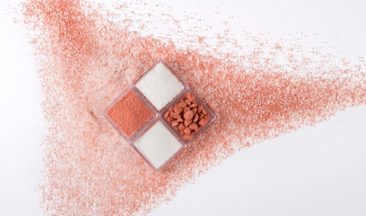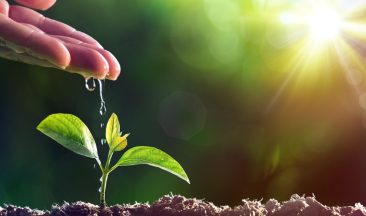ICL is a company that operates worldwide in the field of specialty minerals. We are a leading manufacturer in the global food, agriculture, and industrial markets. We offer a wide range of key agricultural nutrients, specialty fertilizers, and innovative sustainable solutions designed to help growers optimize crop yields, health, and quality.
We are a leading manufacturer and supplier of fertilizers, including controlled-release, water-soluble fertilizers, and liquid fertilizers, Polysulphate-based, potash, phosphate, and granular compound fertilizers. We are committed to promoting sustainable agriculture practices that stimulate soil health, increase nutrient use efficiency, reduce water usage, and minimize carbon footprint.
ICL is focused on creating long-term value while addressing environmental, social, and governance risks and opportunities. ICL has set targets to reduce environmental impact and enhance social responsibility.
These targets address key sustainability initiatives such as reducing carbon emissions, conserving water resources, promoting circular economy practices, ensuring responsible sourcing, and creating sustainable products. ICL’s commitment to sustainability has earned the company recognition in key areas, such as CDP’s 2021 (Climate Change disclosure), the ‘Maala’ leading Israeli ESG ranking, and FTSE’s index.
Ultimately, ICL’s commitment to sustainability is reflected in its business practices, supply chain, products, and in its partnerships – like the partnership with the Indian Potash Limited (IPL), the largest potash supplier in India for the Potash for Life Initiative.
The Potash for Life Initiative is designed to increase crop productivity by improving the use of potash in India specifically. Potash for Life promotes optimized and balanced fertilization and educates farmers about the important role that potassium plays in plant nutrition and soil fertility.
ICL’s Partnership with Potash for Life
Through its strategic partnership with IPL in the Potash for Life Program, ICL has been instrumental in advancing the use of potash in Indian agriculture. Leveraging its technical expertise and research and development capabilities, ICL has conducted thousands of demonstration plots all over India to evaluate and show the benefits of potash on various crops and soil types in India.
As a leading potash supplier, ICL is uniquely positioned to provide expertise to Potash for Life, too. The company has offered valuable training and education to farmers, dealers, and agronomists to encourage the balanced use of fertilizers, including potash in crop nutrition. Trials and demonstration plots help farmers visibly see the proof of the benefits of potash fertilizer. Farmers are able to see, experience, and share the results.
Dr. Patricia Imas, ICL Agronomist, is managing the Potash for Life project. She engages with Indian farmers at least once a year, noting that the initiative is intended to support farmers’ use of fertilizers in an optimized way through increased cooperation with farmers.
“When we talk about; fulfilling the essential needs of humanity,’ this project is exactly what we are talking about. ‘Potash for Life’ is actually a guidance and education program for farmers, which combines two interests that benefit everyone. On our part, we hope to drive potash utilization, and farmers around the world aim to make their farming profitable and sustainable,” said Dr. Imas.
Potash for Life is just one clear example of how ICL is committed to sustainable agriculture practices and is dedicated to enhancing Indian farmers’ livelihoods.

Potash for Life Program
In 2010, potash prices in both international and Indian domestic markets skyrocketed due to the Indian government reducing potash subsidies. As prices rose, farmer use of potash in the optimized NPK ratio dropped drastically. Since then, potash consumption has remained low, risking crop productivity, soil fertility, and profitability on the farm. This is a sustainability challenge.
To support farmers and increase potash use in India, Potash for Life was born. Potash plays a critical role in plant nutrition because potassium is an essential nutrient, and the benefits of potash are numerous.
Potassium supports plant growth and facilitates various physiological and biochemical processes. Without potassium, plants cannot complete their full lifecycle. Potassium is associated with the movement of water, nutrients, and carbohydrates in plant tissue. It is involved in plant enzyme activation thus affecting photosynthesis and protein, sugars, and starch production. Potassium improves crop quality and resistance to disease and pest attacks, as well as drought and low temperatures stresses. It increases plant strength thus reducing lodging and also increasing nitrogen use efficiency.
Proper use of potash creates dramatic differences in crop yield across many crops, including soybeans, sugar cane, tomatoes, and other vegetables. As one onion grower in Nasik shared, “Potash application resulted in improvement of crop quality. I observed that the size increase and resistance to frost, diseases, and pests improved due to the use of potash.”
Because of the important role of potash, a partnership that was oriented toward sustainability and increasing potash utilization just made sense.
The Potash for Life program is working to achieve life-changing results for farmers and consumers around the world. Key United Nations Sustainability Goals can be achieved through the Potash for Life program, starting with SDG 17.16: enhance global partnerships for sustainable development.
Potash for Life is an example of a global, multi-stakeholder partnership that brings together the expertise and financial resources to enable meaningful progress towards the UN’s Sustainable Development Goals.
Potash for Life addresses Sustainable Development Goal 2: Zero Hunger. Through education about the proper use of potash, the program supports increasing agricultural productivity and small-scale farmer income. It’s a clear demonstration of increased investment in agriculture research to drive productivity where it is most needed.
Potash for Life in Action
Potash for Life has set the standard for farmer and agronomist education through demonstrations that unfold into training workshops, demonstrations, field days, and farmer and dealers meetings. There are opportunities for farmers and dealers to see and share the results and engage directly with experts.
The Potash for Life program also provides informational materials such as brochures, videos, webinars, and social media posts to support farmers in learning more about the benefits of potash and proper dose and application methods for effective and sustainable use.
Through hands-on engagement with farmers and provided educational materials, Potash for Life has been successful at increasing awareness among farmers about the importance of potash and how it can improve crop productivity.
To date, 23 agronomists around India and 500,000 Indian farmers have been reached through the program. 7,000 demonstration plots and 2,000 educational activities have provided opportunities for farmers, dealers, and distributors to learn more about this crucial nutrient.
Through Potash for Life demo plots, farmers get to see, experience, and share yield increases that are meaningful to their bottom line. Average yield increases due to potash application have been 19% for wheat, 13% for rice, 17% for tomato, 20% for onion, and 23% for groundnuts.
The plots have indicated meaningful profitability gains, too. The net profit per hectare and benefit-cost ratio were higher in potash-applied plots than those that received no supplemental potash. In one sugarcane plot in Maharashtra, crop yield climbed 8% and the benefit-cost ratio reached 13.8:1. Those results mean that for each rupee invested in potash, farmers would receive 13.8 rupees in return.
More on the subject:
What is Potash? – The Whole Story
Potash for Life: The Project That Helps People in India Fight Hunger
One step from World Hunger
Potash – and ICL – for the Future
The Potash for Life program improves farmer livelihoods and increases sustainable agriculture practices through shared knowledge with farmers. The program and its outstanding impact are enabled through partnerships that bring the best knowledge and resources together to make a meaningful impact.
Potash for Life is just one of ICL’s many strategic partnerships designed to promote sustainability, including participating in the HarvestZinc project. Currently, ICL has hundreds of field experiments and research projects going on globally. ICL knows that soil fertility and plant nutrition are critical components to feeding a growing population in an environmentally friendly way, and is committed to supporting sustainable agricultural practices.
Doctor Patricia Imas is the Agronomist, Commodities, and FertilizerpluS specialist of ICL. She holds a Ph.D. in Soil and Water from the Hebrew University of Jerusalem and has been part of ICL since 1998. She has been active in plant nutrition and fertilization of crops for over 30 years. Dr. Imas’s experience includes agricultural research and extension programs and consultancies worldwide, especially in Argentina, China, and India. She is passionate about sharing the knowledge available on soil fertility, balanced fertilization to optimize crop nutrition, and the effects of nutrients in soils and their impact on yield, quality, and stress tolerance in plants.








